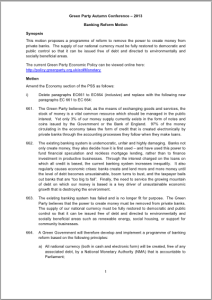by Anne Henow, 19th March 2014
In response to a letter from MP Caroline Lucas, Bank of England governor Mark Carney hinted in the Financial times today that the Bank of England could potentially invest in a programme of ‘Green Quantitative Easing’.
The idea of ‘Green QE’ is that the Bank of England would – with the agreement of the government – buy bonds from e.g. the Green Investment Bank, which could then use the financing to subsidise low carbon projects.
With this move Carney confirms that the “Green New Deal” is technically possible. Caroline Lucas MP and members of the Green New Deal Group (including PRIME director Ann Pettifor) made ‘Green QE’ part of a larger set of policy recommendations for tackling the triple crunch of the financial crisis, climate change and insecure energy supplies.
Ann Pettifor in her post below, argues that the Ukraine crisis demonstrates how much Britain’s security is vulnerable to political as well as economic risks beyond its control.
‘Green QE’ would help finance a programme of clean energy self-sufficiency and efficiency, reducing energy costs, and providing households and firms with more security. Additionally, alternative sources of energy could help reduce Britain’s carbon emissions. The outcome of this environmentally friendly investment would lead to the creation of local, skilled, and higher-paid jobs. Those jobs are desperately needed in a country where job growth does not translate into higher standards of living.
Ms Lucas is cited by the Financial Times as saying that ‘Green QE’ could additionally be used “to help make the country more resilient to flooding, and reduce the threat of climate change.”
Globally, the green bond market is growing. According to Climate Bonds, more than $4bn of labelled “green bonds” have been issued in 2014. The European Investment Bank for example issued a 25-year Green Samuri bond and tapped its 2013 six-year Climate Awareness Bond for another €250bn.
The technical feasibility of ‘Green QE’ has now been clarified at the highest level. Now it´s a question of mobilising political will.
Source Ref
In response to a letter from MP Caroline Lucas, Bank of England governor Mark Carney hinted in the Financial times today that the Bank of England could potentially invest in a programme of ‘Green Quantitative Easing’.
The idea of ‘Green QE’ is that the Bank of England would – with the agreement of the government – buy bonds from e.g. the Green Investment Bank, which could then use the financing to subsidise low carbon projects.
With this move Carney confirms that the “Green New Deal” is technically possible. Caroline Lucas MP and members of the Green New Deal Group (including PRIME director Ann Pettifor) made ‘Green QE’ part of a larger set of policy recommendations for tackling the triple crunch of the financial crisis, climate change and insecure energy supplies.
Ann Pettifor in her post below, argues that the Ukraine crisis demonstrates how much Britain’s security is vulnerable to political as well as economic risks beyond its control.
‘Green QE’ would help finance a programme of clean energy self-sufficiency and efficiency, reducing energy costs, and providing households and firms with more security. Additionally, alternative sources of energy could help reduce Britain’s carbon emissions. The outcome of this environmentally friendly investment would lead to the creation of local, skilled, and higher-paid jobs. Those jobs are desperately needed in a country where job growth does not translate into higher standards of living.
Ms Lucas is cited by the Financial Times as saying that ‘Green QE’ could additionally be used “to help make the country more resilient to flooding, and reduce the threat of climate change.”
Globally, the green bond market is growing. According to Climate Bonds, more than $4bn of labelled “green bonds” have been issued in 2014. The European Investment Bank for example issued a 25-year Green Samuri bond and tapped its 2013 six-year Climate Awareness Bond for another €250bn.
The technical feasibility of ‘Green QE’ has now been clarified at the highest level. Now it´s a question of mobilising political will.
Source Ref

